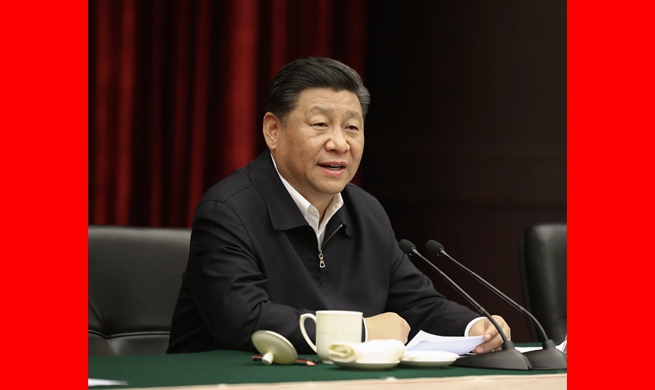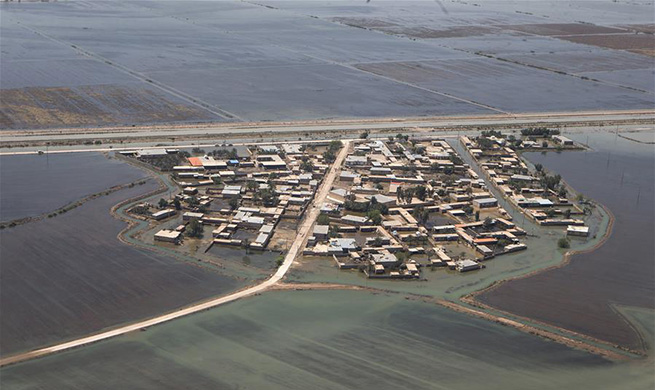by Xinhua writer Liu Yanan
NEW YORK, April 16 (Xinhua) -- U.S. automobile industry insiders continue to express grave concerns about Washington's tariff threat on imported automobiles and parts from Europe and elsewhere at industry meeting Automobile Forum and New York International Auto Show 2019 on Tuesday.
"If the tariffs happened with all the industry, quite frankly, that's pulling the pin down the grenade," warned Bob Carter, executive vice president of Toyota Motor North America at a discussion with Peter Welch, president and chief executive officer with National Automobile Dealers Association (NADA).
"I can't express enough. And it's just a bad idea for the entire industry," said Carter on possible imposition of 25 percent tariffs on imported cars and components.
There is no such thing as a 100 percent U.S.-produced vehicle and all the manufacturers need to survive the global supply chain, said Carter.
Carter estimated that the costs of Toyota Camry, which now has 72 percent U.S. content and 28 percent content relying on imported parts, would go up by 1,800 U.S. dollars per unit once its 28 percent content is subject to 25 percent of tariffs.
The price of imported vehicles would rise more than 17 percent, or an average of around 5,000 dollars per unit and the price of U.S.-made vehicles would grow by about 5 percent, or 1,800 dollars if 25 percent tariffs were imposed on imported parts and vehicles, including that from Canada and Mexico, according to earlier study by the global information provider IHS Markit.
Carter said such possible tariffs would make buying drop, leading to lower capacity utilization, unemployment and ripple-effect on dealers of automobiles.
"It's just a bad situation for the industry and the industry drags economy," added Carter.
U.S. automobile imports would drop 10 percent in 2020 and 14 percent in 2021 if 25 percent tariffs were imposed on finished vehicles and auto parts in the second quarter of 2019, according to a recent analysis by independent maritime research consultancy firm Drewry.
"At the end of the day, we'd like to see lower tariffs, not higher tariffs, because it affects the affordability of vehicles. It affects jobs, and it affects your ability to sell cars. And it affects, quite frankly, consumer choice and the different types of cars that they'll be able to buy," said Welch to Xinhua on the sideline of the meeting.
Research by NADA shows that the imposition of 25 percent tariffs on imported cars and parts would lead to over a million job losses in the United States.
The threat of tariffs by Washington also weighs on investment by automobile manufacturers.
"We're committed to a higher and additional 4,000 jobs in direction in our facilities. But that's based on where we see the market and the confidence of the United States and the confidence of North America," Welch said.
In the latest show of Toyota's commitment to the United States, the automaker said last month that it would expand investment in the world's largest economy by 30 percent to 13 billion dollars by 2021.
The decision on billions of dollars investment in plants is made on the long-term viability in confidence of the market, said Carter.
"We're educating everybody in Washington, D.C. about what we believe to be a very destructive force in the overall order of the automobile industry," Carter told Xinhua.
Carter added that he actually supports President Donald Trump's overall philosophy about bringing investment and employment into the United States and just doesn't want to see a disruptive force as the economy is in very good place.
"We're in good shape right now. Let's not throw the baby out," said Carter.
Thomas King, senior vice president of data and analytics division with market information service provider J.D. Power, said it's more anxiety than reality so far, and from consumers' perspective, people aren't really paying attention to it.
"They get to experience a meaningful impact. So this is more of an industry issue, sort of a back-office set of concerns. But in terms of consumers, we haven't really seen any meaningful impacts," said King.
In February, the Commerce Department submitted a report to the White House on whether to impose tariffs on imported cars and auto parts on national security grounds, drawing backlash from auto makers, suppliers and industry groups.
The president has 90 days to decide whether to adopt the commerce department's recommendations and introduce tariffs on imported vehicles and auto parts.
The United States imported 178.5 billion dollars of cars in 2018 with Japan, Canada, Mexico, Germany and the United Kingdom as the top suppliers, according to WorldsTopExports.com.













